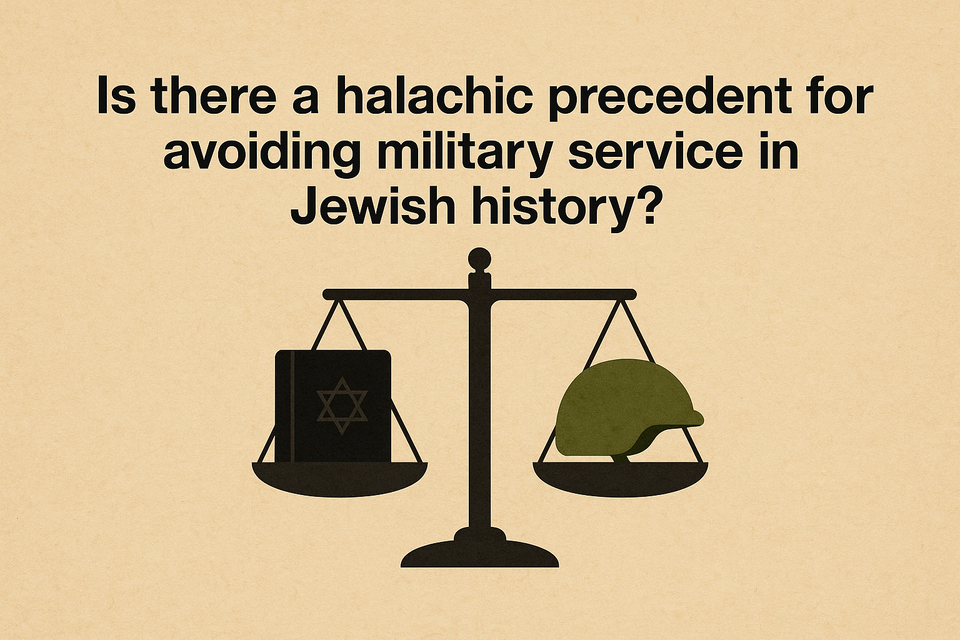Is there a halachic precedent for avoiding military service in Jewish history?

Yes, there is clear halachic precedent throughout Jewish history for avoiding military service when such service presents a threat to one's spiritual life or Torah observance. The concept is deeply rooted in the Torah, Talmud, Rishonim, Acharonim, and rulings of Gedolei Yisrael—especially in eras when military structures were not guided by Torah or placed yirei Shamayim in compromising situations.
1. The Torah’s Exemptions from War
The Torah itself commands that certain individuals be exempt from going to war:
“Who is the man who has built a new house… who has planted a vineyard… who is betrothed to a woman… let him return home…” (Devarim 20:5–7)
The Torah continues:
“Who is the man who is afraid and fainthearted? Let him go and return to his house…” (Devarim 20:8)
Rashi there, quoting Chazal, says this includes someone “who fears his sins”—i.e., his spiritual standing makes him unfit for war. This is not a psychological weakness—it is a religious value. The Ramban adds that even in a war where the entire nation is called upon, those who are not spiritually strong should not go.
Lesson: From the outset, the Torah prioritizes yiras Shamayim and spiritual integrity over national militarism. The battlefield is not for everyone—even when the war is Divinely sanctioned.
2. The Gemara: Not Everyone Should Serve
In Sotah 44b, the Mishnah outlines several categories of those exempt from war. The Gemara expands: even in a milchemes mitzvah (obligatory war), only certain men are called upon, and often only those with absolute spiritual strength.
Chazal explain: soldiers need more than bravery—they need zechus (merit), or else their presence endangers everyone else. A soldier with spiritual weakness, or who lacks Torah commitment, is a liability.
3. Historical Precedents in Jewish Communities
Throughout Galus, frum Jews lived under governments that required conscription. And Gedolei Yisrael consistently ruled to avoid military service, often at great personal and communal risk.
Czarist Russia
- Rav Yitzchak Elchanan Spektor zt”l and other Gedolim worked tirelessly to secure exemptions from the Russian draft, seeing it as a spiritual death sentence for young bnei Torah.
- The “Cantonist decrees” under Czar Nicholas I forcibly conscripted Jewish boys—often from age 12—for 25 years of service. Gedolim viewed this as a gzeiras shmad (decree of religious persecution)
- Communities raised large funds—pidyon shevuyim—to ransom bochurim or bribe officials to prevent their enlistment.
Rav Yisroel Salanter zt”l:
He supported efforts to prevent talmidim from being drafted, warning of the spiritual devastation that would come from placing yeshiva boys in godless military frameworks.
4. Halachah: Danger to Spiritual Life Overrides National Obligation
The Rambam rules:
“If a person is in a situation where he will be forced to violate the Torah, even due to pressure from a king or government, he must avoid that situation, even at great cost.” (Hilchos Yesodei HaTorah 5:1–4)
And in Hilchos Talmud Torah 3:1, he writes:
“Torah is greater than saving lives… because it brings to both this world and the next.”
When army service leads to bitul Torah, exposure to nivul peh, pritzus, secular ideology, or outright aveiros—Gedolim ruled that it is not a legitimate option, even if that means enduring legal or social pressure.
5. Contemporary Rulings: The Army as a Sakana
Rav Elazar Menachem Man Shach zt”l:
“There is no greater danger to the soul of a bochur than being forced into the army.” (Vaad HaRoshei Yeshivos, 1999)
Rav Shlomo Zalman Auerbach zt”l:
“Even if the army made every accommodation, it cannot recreate the kedushah of the beis midrash. And when that is lacking, a Jew is in danger.” (Heard from talmidim, Halichos Shlomo)
Rav Aharon Leib Shteinman zt”l:
“To send a young man into an environment without Torah is not service—it is destruction.” (Vaad Chinuch, 2012)
6. A Powerful Story: Rav Chaim Brisker’s Stance
When the Russian government was offering yeshivos exemption certificates—on the condition that they teach secular subjects—Rav Chaim Soloveitchik zt”l refused.
He was offered an exemption for all his talmidim if he would add a few government-approved classes. He replied:
“If it means compromising Torah—even one iota—I would rather send them to jail than to a yeshiva that teaches kefirah.”
The message was clear: no deal is worth the price of the neshama.
Summary
- Torah explicitly exempts individuals from war based on their spiritual condition.
- The Gemara reinforces that not all Jews are meant to fight.
- Throughout history, Gedolim fought against conscription where it endangered Torah and mitzvos.
- The Rambam and others ruled that spiritual risk overrides national obligation.
- Modern-day Gedolim maintain that today’s army structure poses serious threats to religious life, and forcing bnei Torah to join is halachically indefensible.
Final Thought
When Charedim avoid army service, it is not out of laziness or lack of patriotism. It is out of mesirus nefesh—a willingness to be hated, misunderstood, and jailed if necessary—for the sake of the eternal call of Torah.
“Torah is not a hobby. It is the lifeblood of our people.” (Rav Moshe Shmuel Shapiro zt”l)
Footnotes and Sources
- Devarim 20:5–8 – Laws of wartime exemptions.
- Sotah 44b – Gemara on exemptions and the role of spiritual fear.
- Rambam, Hilchos Yesodei HaTorah 5:1–4 – Avoiding spiritual coercion.
- Rambam, Hilchos Talmud Torah 3:1 – The superiority of Torah learning.
- Cantonist history – Documented in Jewish Encyclopedia and A History of the Jewish People (Ben-Sasson).
- Rav Shach, Rav Shteinman, Rav Shlomo Zalman Auerbach – See Michtavim U'Maamarim, Mevakshei Torah, and Halichos Shlomo.
- Story of Rav Chaim Soloveitchik – Cited by Rav Dovid Cohen shlita in public shiur (Yeshivas Chevron Archives).
